

40 techniques of the Illuminati. Americans are possessed with ennui and malaise, and worst of all, fears.
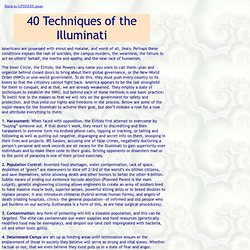
Perhaps these conditions explain the rash of suicides, the campus murders, the weariness, the failure to act on others’ behalf, the inertia and apathy, and the near lack of humanism. The Inner Circle, the Elitists, the Powers—any name you want to call them—plan and organize behind closed doors to bring about their global governance, or the New World Order (NWO) or one-world government. To do this, they must push every country to its knees so that the citizenry cannot fight back. America appears to be the last stronghold for them to conquer, and at that, we are already weakened. They employ a slate of techniques to establish the NWO, but behind each of these methods is one basic practice: To instill fear in the masses so that we will rely on the government for safety and protection, and thus yield our rights and freedoms in the process. 1. 2. 3. 4. 5. 6. 7. 8. 9. 10. 11. 12. 13. 14. 15. 16.
Supreme Council for Scotland. The Illuminati in America, Part 13: The UN or 'Supreme World Council' Marxism. Marxism is a worldview and a method of societal analysis that focuses on class relations and societal conflict, that uses a materialist interpretation of historical development, and a dialectical view of social transformation.
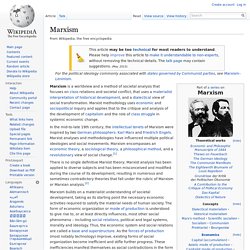
Marxist methodology uses economic and sociopolitical inquiry and applies that to the critique and analysis of the development of capitalism and the role of class struggle in systemic economic change. In the mid-to-late 19th century, the intellectual tenets of Marxism were inspired by two German philosophers: Karl Marx and Friedrich Engels. Marxist analyses and methodologies have influenced multiple political ideologies and social movements. Marxism encompasses an economic theory, a sociological theory, a philosophical method, and a revolutionary view of social change.[1] Marxism builds on a materialist understanding of societal development, taking as its starting point the necessary economic activities required to satisfy the material needs of human society. Communism. Communism is represented by a variety of schools of thought, which broadly include Marxism, anarchism and the political ideologies grouped around both.
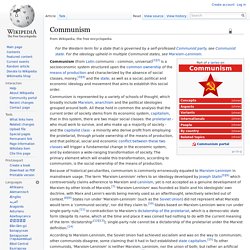
All these hold in common the analysis that the current order of society stems from its economic system, capitalism, that in this system, there are two major social classes: the proletariat - who must work to survive, and who make up a majority of society - and the capitalist class - a minority who derive profit from employing the proletariat, through private ownership of the means of production, and that political, social and economic conflict between these two classes will trigger a fundamental change in the economic system, and by extension a wide-ranging transformation of society.
The primary element which will enable this transformation, according to communism, is the social ownership of the means of production. Because of historical peculiarities, communism is commonly erroneously equated to Marxism-Leninism in mainstream usage. Fascism. Fascism (/ˈfæʃɪzəm/) is a form of radical authoritarian ultranationalism,[1][2] characterized by dictatorial power, forcible suppression of opposition and strong regimentation of society and of the economy,[3] which came to prominence in early 20th-century Europe.[4] The first fascist movements emerged in Italy during World War I before it spread to other European countries.[4] Opposed to liberalism, Marxism and anarchism, fascism is usually placed on the far-right within the traditional left–right spectrum.[5][6][7][4][8][9] Fascists saw World War I as a revolution that brought massive changes to the nature of war, society, the state and technology.
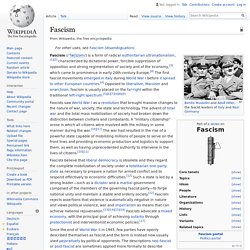
The advent of total war and the total mass mobilization of society had broken down the distinction between civilians and combatants. Etymology Definitions John Lukacs, Hungarian-American historian and Holocaust survivor, argues that there is no such thing as generic fascism. Position in the political spectrum "Fascist" as a pejorative History. Supreme leader. There have been many dictators and political party leaders who have assumed such personal and/or political titles to evoke their supreme authority.
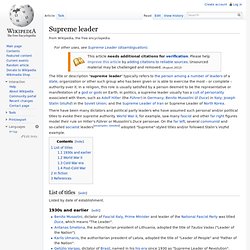
World War II, for example, saw many fascist and other far right figures model their rule on Hitler's Führer or Mussolini's Duce personae. On the far left, several communist and so-called socialist leaders[examples needed] adopted "Supreme"-styled titles and/or followed Stalin's Vozhd example. List of titles[edit] Listed by date of establishment. 1930s and earlier[edit] World War II[edit] Cold War era[edit]